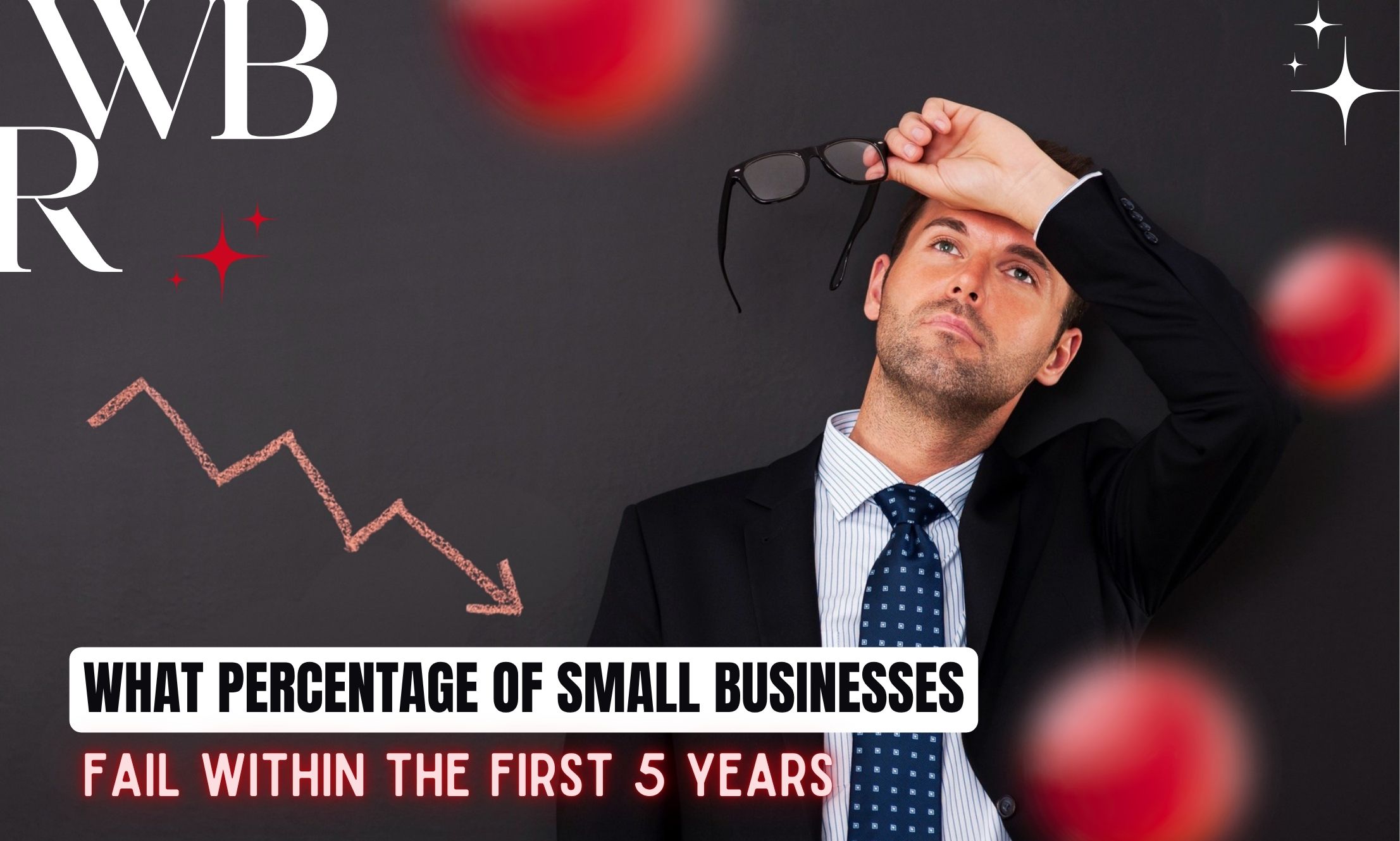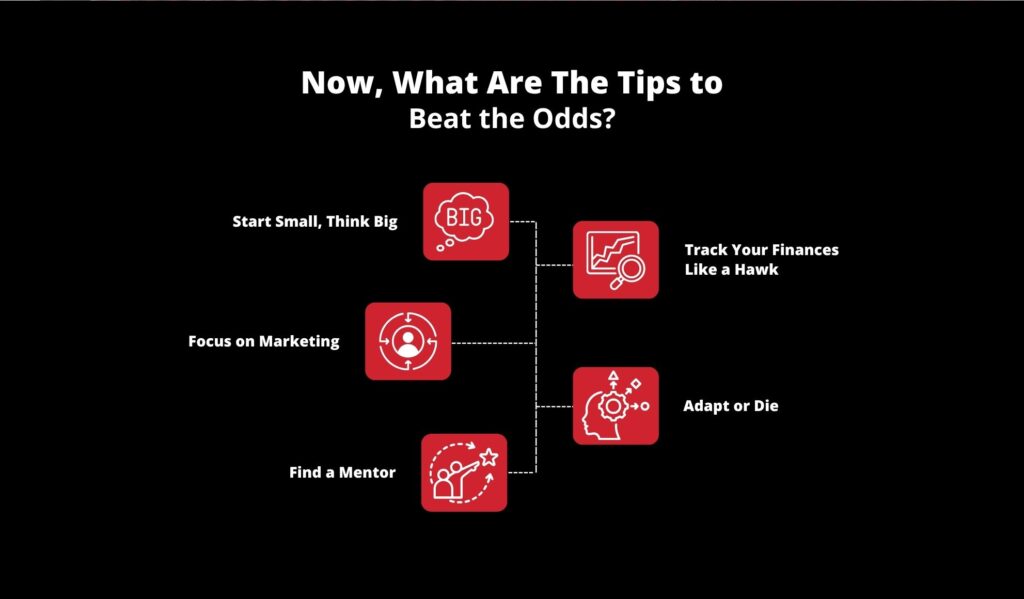What Percentage of Small Businesses Fail Within the First 5 Years? Let’s Talk Numbers and Realities
by Barsha Bhattacharya Small Business 16 May 2025

If you ask me, starting a business is more like planting a tree. You need faith, vision, and a whole different level of nurturing. But you cannot expect every seed to become a giant oak, right?
Some may die, not bear the fruit, or even grow taller than usual. The same happens in the business field as well.
And, this is where the question comes: What percentage of small businesses fail within the first 5 years? Trust me, that is the million-dollar question I will answer today!
I will help you with the facts, real-world insights, and all the friendly nudge that can help you with encouragement.
First things first: The number that never lies

Let’s cut to the chase! Yeah? Almost 50% of small businesses fail to achieve something within the first 5 years.
So, how many small businesses fail in the first year? According to the U.S. Bureau of Labour Statistics (BLS), if we dig a little deeper, we will see that around 20% of small businesses fail in their first year only. (This really sucks!)
So, it is fine if you are feeling a little nervous, if you are planning to start your business, maybe you are already on your rollercoaster ride as an entrepreneur! Trust me, it’s alright to feel that way! You’re not Alone!
Once you understand what percentage of small businesses fail within the first 5 years, it’d be easier for you to avoid becoming a part of those statistics. It is quite empowering, right?
Why Do So Many Small Businesses Fail?

Now it is time to ask, “why” the small businesses keep failing? Well, here are some of the common reasons that you must know!
Now that we’ve laid out the facts, it’s time to ask the “why.” What causes half of all new businesses to shut their doors before hitting their five-year mark? Here are some of the most common reasons:
Cash flow problems: Around 82% of businesses continue to fall due to their poor cash management structure. It can be anything! Maybe you underestimated the start-up costs, or maybe you didn’t have enough buffer for the lean season (or as we call it: slower months!).
Lack of understanding about market needs: It is quite surprising to see entrepreneurs focus on building a business based on what they want to sell! I mean, it’s quite a failure if you cannot grasp what customers are looking for!
Poor business planning: I feel like it’s a crime not to have a solid business plan, marketing strategy, or financial projections as part of your startup business ideas. Trust me! These can send things south real quick!
Competition: Another major mistake is entering a saturated marketplace without a proper competitive edge.
Burnout: Yes! You just read it right! Burnout or mental exhaustion is real! Many founders out there have felt overwhelmed at some point in their entrepreneurial journey.
So, if you are planning to establish a business or are already tackling one, it is necessary to understand the pitfalls. That is the only key to your success. I mean, you cannot dodge if you don’t know what’s coming at you!
What Industries Have the Highest and Lowest Failure Rates?

Do not expect that all businesses have faced the same odds. It is somewhat dependent on the industry. The risk of failure also varies based on the type of industry.
Here are some of the industries where the failure rate is pretty high!
- First comes the restaurant and food services. This field is pretty competitive and comes with high overhead. You may feel it is tricky enough to manage.
According to the National Restaurant Association or NRA, the average failure rate of restaurants and food services is near around 30 percent.
- Second we have the retail sector. The ecommerce is currently booming in 2025. Thus, the brick and mortar stores are facing an uphill battle.
The failure rate may vary! However the common statistics shows that around 20% of the retail businesses fail within the first five years.
- Construction businesses also face failure is the strategies are not right. The industry is volatile. Thus, it can be easily affected by the economy, contracts and seasons.
Around 83% of the construction companies fail within 20 years.
Now let’s talk about the industries where the failure rate is pretty low!
- First, we have healthcare services. There is always a steady demand in this sector, even during economic downturns.
- Secondly, there are professional service providers like accounting and legal firms that cater to a consistent demand. You just need to have the right certification.)
- The next is real estate services. As the real estate demand is increasing, exoriences agents and brokers are being able to build a strong resilient around the business.
So, yes! The question “What percentage of small businesses fail within the first 5 years?” may have around 50% data, but the odds of having a failed business still depend on your particular niche.
Real Stories, Real Lessons: The Examples

Let’s take a break from the stats and talk about the human side of the business, shall we?
Behind every single business ideas, there is a person with a heck load of dreams and passion. And sometimes, even the failed businesses come with massive wins.
Take Sir Richard Branson as an example. He founded Virgin group which is still considered as an successful small business story. He started his entreprenral journey at the age of 16 with his student run magazine named “Student.”
His aim was simple—to provide a single platform for people to express their views on music, culture, and politics
Despite all the possible challenges, Branson stayed prsistenat with his business strategy. His determination led his next venture “a mail order record business” into Virginia record.
Now we all are aware of the success of the company. Sir Branson credits all his success to taking risks, putting a lot more focus on team and lastly, never being afraid to dream big.
He stated, “Train people well enough so they can leave, treat them well enough so they don’t want to.”
So, the takeaway? Failure doesn’t always mean the end. Sometimes, it’s just the beginning of a better chapter.
Now, What Are The Tips to Beat the Odds?

Alright, let’s come back to the numbers again! If 50% of the businesses fail to make it past 5 years, what exactly can you do? Here are some battle-tested strategies that you can follow:
1. Start Small, Think Big
Do not blow your entire budget in one month. Secondly, you must test your product or service on a smaller scale. Try to learn from your customers, and then scale up.
2. Track Your Finances Like a Hawk
Secondly, you can try using accounting software. If needed, you can also hire a good bookkeeper. This way you can always know whether your cash is in position or not!
All I want to say is that you have to ensure you are not financially blind, as it can be a fast way to crash.
3. Focus on Marketing
No matter how good your product is, if nobody knows it exists, it won’t sell. So, try to invest some quality time as well as budget in marketing. Try to talk to the industry experts if needed. They can help you understand what kind of digital channel can be fruitful for you!
4. Adapt or Die
The market will continue to change. The trends will evolve, and the customers will need to shift. So, stay focused as much as you can! Always remember that your business can only survive if you know when to pivot and when you must not!
5. Find a Mentor
Don’t do it all by yourself. You can always seek guidance from those who have already been there! You can always participate in formal mentorships, online communities, support groups, and networking groups if needed.
Data, Data Data! Data-Driven Decisions Are Key
I can tell you why you must be obsessed with data. Data is something that you will need at every step of your business, whether you are launching a new product or opening a new location.
The right data should back everything! These data will help you to understand the trends, know your customer base, and further analyse what may or may not work for you.
Having the data-first approach can become more essential when you start to stay mindful of the percentage of small businesses that fail within the first 5 years.
Suppose the numbers are leading you instead of the guesswork! Trust me! You are on the right path.
Encouragement for New Entrepreneurs

We cannot avoid the brighter side! If 50% of the small businesses fail in five years, the other half of them succeed. It is not a bad coin toss—especially if you are properly equipped with the right mindset, support and tools.
Starting a business is not just a financial journey! There’s a lots of emotions too! You may experience a lot of incredible things as well! In every step, forward and backward, the journey will always teach you something valuable.
Do not lose hope, even if your first venture doesn’t work out! You will always find the right door to something better.
Many successful entrepreneurs didn’t make it until their second, third, or even fourth business. It’s all part of the journey.
Even if your first venture doesn’t work out, it often opens the door to something better. Many successful entrepreneurs didn’t “make it” until their second, third, or fourth business. It’s all part of the journey.
Remember: failure is just one version of learning. And if you’re in it for the long haul, you’ve already got the most important ingredient—grit.
Also read



































































































